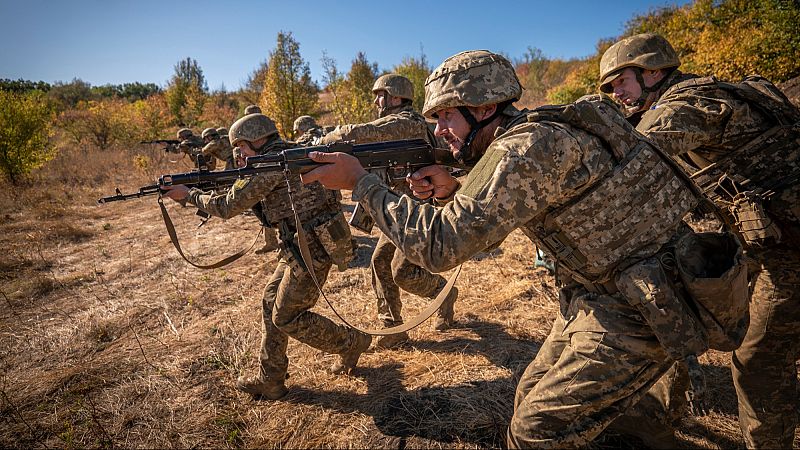
The need to ramp up basic defence equipment like rifles and small-calibre ammunition is not being discussed enough by EU policymakers with big-ticket weapon systems like counter-drone measures and missiles too often receiving all the focus and money, the head of Beretta told Euronews.
Most of the Italian company's business is civilian, for hunting essentially, but defence and law enforcement have been gaining ground over the past four years, now accounting for a third of sales.
Europe has seen a surge in defence spending since Russia launched its full-scale invasion of Ukraine in early 2022. The EU put forward a €800 billion plan to rearm earlier this year while the NATO military alliance has also set new capability targets for its members.
But Beretta CEO Carlo Ferlito told Euronews that European policymakers are not paying enough attention to small-calibre ammunition and planning accordingly.
The privately-held company, which next year will celebrate its 500 years of existence, primarily produces firearms and accessories such as clothing and optics, but ventured into small calibre ammunition two years ago.
"As human beings we are pushed to try to solve the last problem we are facing, and the last problem we're facing at the moment is the war in Ukraine. So you know, the mid-calibre or large-calibre seems to be the priority," Ferlito said on the margins of the European Defence & Security Conference held in Brussels on 14 October.
"But at the end of the day, the small calibres are absolutely critical for the survivability of our soldiers and our troops and so the investments that need to be done on small calibres are equally important," he added.
'A drone is a clay that flies faster'
The company, for instance, barely benefited from ASAP, the EU's €500 million programme to urgently deliver ammunition and missiles to Ukraine and replenish member states' stocks since its launch in 2023 as most of the production focused on large calibre items.
The EU has since identified four pan-European flagship projects, of which the so-called drone wall is one, as well as nine capability priority areas for member states to invest in as a matter of urgency. These include missile and ammunition.
The aim is to incentivise member states to pool procurement in a bid to cut costs, accelerate deliveries and enhance interoperability.
But demand has been fragmented, Ferlito said. Requests to the group, which has more than 50 subsidiaries worldwide, have been coming in mostly along national lines.
Yet consolidation could be done quickly, according to Ferlito, given most EU member states use standardised NATO calibres, provided they could all agree on a spec.
Similarly, talks of innovation in the defence sector have focused heavily on new technologies but smaller equipment, like rifles, also deserve a slice of the pie, according to the executive.
The company has, for instance, developed an anti-drone shotgun with a specific ammunition that has been tested in Ukraine and is now being used by Danish and Italian forces, among others.
"We come from hunting and then clay shooting. At the end of the day, a drone is a clay that flies at a faster speed, maybe at the same speed, with a payload. We know how to take down clay so we thought: why don't we try to take down drones in this way?" he told Euronews.
And it is now developing polymer ammunition to take down drones in urban areas or over critical infrastructure like airports.
'Allow us to manufacture in Europe'
In its bid to kickstart the European defence industrial base, the European Commission has also put forward a big simplification package that aims to make it easier for companies to secure the materials they need as well as the permits they might require to expand.
The main challenge when it comes to ammunition for Beretta is a lack of raw materials, in particular gunpowder, and the nitrocellulose needed to make it, because large quantities go towards filling mid to large-calibre requests.
The bloc, Ferlito said, needs to work on "how to guarantee a supply chain that is able to cover the entire spectrum of its ammunition".
Additionally, while the Commission has included waivers for the defence industry to continue using certain substances the bloc is cracking down on for civilian applications, this still represents a problem for weapon manufacturers given their suppliers might decide to simply fold these activities if they lose most of their civilian clients.
"Allow us to manufacture in Europe the components that are necessary to secure your ammo supply chain, (including) nitrocellulose, and lead," Ferlito said. "At the end of the day, it's important that in Europe we can generate an ecosystem that allows us to have the entire network and not rely on somebody else."







